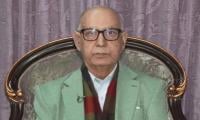The right to dignity in Pakistan’s constitution is not limited to the citizens of Pakistan, but to anyone living on this land, stressed criminal defence lawyer Farah Khan.
She was of the idea that if Afghan immigrants do not possess government documents, it is the government to be blamed, not them, because the state never opted for their documentation in the first place.
She was speaking at a panel discussion titled ‘Let’s Talk: Repatriation Policies’ at Goethe Institut Karachi on Wednesday hosted by Goethe Institut Pakistan. The discussion focused on the current refugee crisis and asylum policies.
The panel discussion delved into the humanitarian impact of the new repatriation policy in Germany or Pakistan. The affected people face enormous challenges, and local solutions are just as important as a comprehensive understanding of the global refugee crisis.
Farah said that the legislation and policymaking in Pakistan was mainly politicised. Politicians, she said, were not capable of understanding what should be for the policy for the next five years, while bureaucracy had failed to do its job as well.
She said that the constitution of Pakistan guarantees dignity for everyone. She asked what the state did against government officials who failed to provide documents to Afghan immigrants in the last 45 years. “Who is to blame? It is the government to be blamed,” she said, adding that Afghans reached out to NADRA for documentation, they were not facilitated, rather they were subjected to unnecessary want for documentation.
When these Afghans approached courts, they did not hear their petitions. In many cases, she said, NADRA demanded documentation from Afghans which dated back to 45 years, and they certainly failed to produce such documents.
The moderator of the session, who is also a journalist, Hunain Ameen, asked journalist Naimat Khan why the policy decision of repatriation of Aghans was not taken by an elected popular government. He responded that even if there was an elected government, the repatriation would have taken place. When an elected government could pass a resolution in favour of military courts, how they could oppose Afghan repatriation.
Naimat said that the perception that Karachi had the highest number of Afghan immigrants was wrong. He said that the city had far smaller number of Afghan immigrants than in Khyber Pakhtunkhwa.
Advocate Moniza Kakar said that she had seen Afghan people being detained to be repatriated despite producing valid documents to the authorities. Responding to one of the queries by one of the participants whether only undocumented Afghans were being held in the holding cells, she said that she could take anyone who was interested to learn the ground reality, to the courts and to the holding center. So that they would know how discriminatory this whole process was at its heart.
Aurat March representative Zoha Alvi said that calling Afghan immigrants aliens was dehumanising. She made references to a number of cases where women and children were disparaged at the holding centers or their Afghan settlements in Karachi.
Responding to a question about rationale behind the objections against the government by human rights agencies, Ameen cited a judgment by Justice Babar Sattar of the Islamabad High Court, wherein it was mentioned that the government itself mandated the UNHCR for the regulation of the refugees. Deducing that if the documents provided to refugees by the UNHCR were not regarded as valid documents now, it would reflect terribly on the government.
An outer view of a branch of Bank Makramah Limited. — yandex maps/FileKARACHI: The shareholders of Bank Makramah...
This representational image shows water coming out from a pumping station. — APP/FileHYDERABAD: Hyderabad Water &...
The representational image shows a passenger train of the Pakistan Railways. — PR website/FileThe Pakistan Railways...
A representational image shows a handcuffed suspect standing behind bars. — APP/FileIn a successful operation based...
The representational image shows the entrance of the FIA headquarters. — APP/FileThe key role of an Indian agent in...
Muttahida Qaumi Movement-Pakistan senior leader Dr Farooq Sattar meets representatives and office-holders of the...







